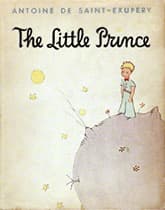The Little Prince
Critique • Quotes • Translations
 First edition in English
First edition in EnglishOriginal title
Le petit prince
First publication
1934
First translation into English
1943
Literature form
Novella
Genres
Fantasy, children's
Writing language
French
Author's country
France
Length
Approx. 15,500 words
Enchanté, to be sure
The books that became cult—and counterculture—favourites in the iconoclastic 1960s and early 1970s can be divided into two categories:
1. Those that were written during and for that period, such as Stranger in a Strange Land, Catch 22, One Flew over the Cuckoo's Nest, The Harrad Experiment, Slaughterhouse Five, and Zen and the Art of Motorcycle Maintenance.
2. Those that had been written earlier but became newly popular in this period, like On the Road, The Hobbit, The Little Prince, The Doors of Perception, Steppenwolf, Damian and everything else by Herman Hesse.
Both groups of books tapped into veins of dissatisfaction with mainstream mores. The anti-establishment works produced during that time tended to represent youthful rebellion against old political and sexual morality. But many that won acolytes in this period were not concerned about such passing matters but dealt with a supposedly deeper search for meaning during the tumultuous events of this time. The establishment they opposed was the rule of cold practicality, nonhuman values, and narrow-minded self-interest. The alternative they promoted was not liberation so much as the cultivation of each individual's soul and the engendering of life-affirming relations, bordering on or crossing over into mysticism.
Of course I am exaggerating. Not all the works mentioned can be summed up so succinctly. But The Little Prince does fall squarely into this latter group. It may be the simplest, most primitive representation of the countercultural spiritual viewpoint.
The simplicity perhaps comes from it supposedly being written for children. I don't know if this is true. I doubt the characters and storyline would be particularly entrancing for kids compared to other modern entertainments.
What gives people the idea it's a kids' book may be that much of The Little Prince is presented as the views of a child—albeit a child from another, very tiny planet. It abounds in lines like "Grown-ups never understanding anything by themselves and it is rather tedious for children to have to explain things to them time and time again" and "Only children know what they are looking for".
Not to mention the fact that the text is interspersed with hand-drawn sketches by the author.
For adult children
It is also quite simply written, which is always a plus for readers of any age.
But The Little Prince is not really for kids. Rather it's intended to encourage adults to be like kids.
I'm not going to get into the book's ideas. Frankly they bore me. It's healthy to look at life from various perspectives, including the naïve view, to shake up and question one's own assumptions about what is important. But I doubt this viewpoint provides an ongoing guide to living, as its most fanatical fans seem to believe. Or once seemed to believe.
I'll leave it at recommending The Little Prince as an enchanting story you can enjoy from time to time and make of what you wish.
The available translations into English are all acceptable, with slight stylistic differences that do not greatly affect the enjoyment of the book. Important if you want to get your profound-sounding quotes right though.
— Eric
Critique • Quotes • Translations

